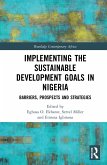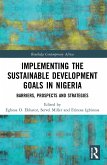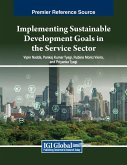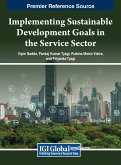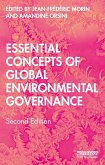Essential Concepts for Implementing the Sustainable Development Goals
An A-Z Guide
Herausgeber: Biermann, Frank; Kang, Yi Hyun; Hickmann, Thomas
Essential Concepts for Implementing the Sustainable Development Goals
An A-Z Guide
Herausgeber: Biermann, Frank; Kang, Yi Hyun; Hickmann, Thomas
- Gebundenes Buch
- Merkliste
- Auf die Merkliste
- Bewerten Bewerten
- Teilen
- Produkt teilen
- Produkterinnerung
- Produkterinnerung
This book provides a highly accessible and easy-to-navigate overview of the essential concepts and terms related to the current global endeavour to implement the Sustainable Development Goals.
Andere Kunden interessierten sich auch für
![Implementing the Sustainable Development Goals in Nigeria Implementing the Sustainable Development Goals in Nigeria]() Implementing the Sustainable Development Goals in Nigeria167,99 €
Implementing the Sustainable Development Goals in Nigeria167,99 €![Implementing the Sustainable Development Goals in Nigeria Implementing the Sustainable Development Goals in Nigeria]() Implementing the Sustainable Development Goals in Nigeria56,99 €
Implementing the Sustainable Development Goals in Nigeria56,99 €![Implementing Sustainable Development Goals in the Service Sector Implementing Sustainable Development Goals in the Service Sector]() Implementing Sustainable Development Goals in the Service Sector188,99 €
Implementing Sustainable Development Goals in the Service Sector188,99 €![Implementing Sustainable Development Goals in the Service Sector Implementing Sustainable Development Goals in the Service Sector]() Implementing Sustainable Development Goals in the Service Sector252,99 €
Implementing Sustainable Development Goals in the Service Sector252,99 €![Essential Concepts of Global Environmental Governance Essential Concepts of Global Environmental Governance]() Essential Concepts of Global Environmental Governance49,99 €
Essential Concepts of Global Environmental Governance49,99 €![Essential Concepts of Global Environmental Governance Essential Concepts of Global Environmental Governance]() Essential Concepts of Global Environmental Governance167,99 €
Essential Concepts of Global Environmental Governance167,99 €![Translation and the Sustainable Development Goals Translation and the Sustainable Development Goals]() Meng JiTranslation and the Sustainable Development Goals64,99 €
Meng JiTranslation and the Sustainable Development Goals64,99 €-
-
-
This book provides a highly accessible and easy-to-navigate overview of the essential concepts and terms related to the current global endeavour to implement the Sustainable Development Goals.
Produktdetails
- Produktdetails
- Verlag: Routledge
- Seitenzahl: 226
- Erscheinungstermin: 24. Juli 2025
- Englisch
- Abmessung: 250mm x 175mm x 17mm
- Gewicht: 577g
- ISBN-13: 9781032857251
- ISBN-10: 1032857250
- Artikelnr.: 73481017
- Herstellerkennzeichnung
- Libri GmbH
- Europaallee 1
- 36244 Bad Hersfeld
- gpsr@libri.de
- Verlag: Routledge
- Seitenzahl: 226
- Erscheinungstermin: 24. Juli 2025
- Englisch
- Abmessung: 250mm x 175mm x 17mm
- Gewicht: 577g
- ISBN-13: 9781032857251
- ISBN-10: 1032857250
- Artikelnr.: 73481017
- Herstellerkennzeichnung
- Libri GmbH
- Europaallee 1
- 36244 Bad Hersfeld
- gpsr@libri.de
Frank Biermann is Professor of Global Sustainability Governance at the Copernicus Institute of Sustainable Development, Utrecht University, the Netherlands, and the 2025 Zennström Visiting Professor in Climate Change Leadership at Uppsala University, Sweden. Thomas Hickmann is Associate Professor in the Department of Political Science at Lund University in Sweden. He is highly committed to interdisciplinary collaborations, research-based education and engagements with civil society to identify pathways towards sustainability transformations. Yi hyun Kang is Postdoctoral Researcher in the Department of Political Science at Lund University in Sweden. Her research explores the role of civil society and technology in environmental politics and governance. Her research interests have been shaped by professional experiences in journalism, international development, and applied research. Carole-Anne Sénit is Assistant Professor of Inclusive Sustainability Governance with the Copernicus Institute of Sustainable Development at Utrecht University, the Netherlands. The corpus of her research assesses the democratic legitimacy of sustainability governance, with a particular attention to whether and how citizens can take part in and influence the decisions that affect their lives. Yixian Sun is Associate Professor in International Development and a UKRI Future Leaders Fellow at the University of Bath, United Kingdom. He studies transnational governance, environmental politics and sustainable development with a focus on emerging economies.
About the editors
List of contributors
Acknowledgements
1 Essential Concepts for Implementing the Sustainable Development Goals: An
Introduction
2 2030 Agenda for Sustainable Development
3 Accountability
4 Anthropocene
5 Artificial intelligence
6 Brundtland Report
7 Budgeting for Sustainable Development
8 Business sector
9 Civil society
10 Climate change and sustainable development
11 Climate finance
12 Commission on Sustainable Development (CSD)
13 Coordination
14 Corporate Social Responsibility (CSR)
15 Custodians
16 Data gaps
17 Development banks
18 Discourse and discursive effects
19 Education for Sustainable Development
20 Effectiveness
21 Finance mechanisms
22 Fragmentation
23 Gender mainstreaming
24 Global Sustainable Development Reports (GSDR)
25 Governance by global goal-setting
26 High-level Political Forum on Sustainable Development (HLPF)
27 Human Rights
28 Implementation
29 Inclusiveness
30 Independent Group of Scientists (IGS)
31 Indicators
32 Indigenous views
33 Inequality (global and national)
34 Institutions and institutional effects
35 Integration
36 Integrity (ecological and planetary)
37 Interaction and interlinkages
38 International Environmental Agreements
39 International Monetary Fund (IMF)
40 International organizations
41 Justice perspectives
42 'Leave no one behind'
43 Legitimacy
44 Living wages
45 Localization
46 Major groups and other stakeholders
47 Millennium Development Goals (MDGs)
48 Modelling
49 Multi-level governance
50 National Sustainable Development Strategies (NSDS)
51 Negotiation of the Sustainable Development Goals
52 Network analysis
53 Nexus governance
54 Norms and normative effects
55 North-South relations
56 Official development assistance (ODA)
57 Orchestration
58 Paris Agreement
59 Participation
60 Partnerships
61 People, Planet, Prosperity, Peace, Partnerships (5 Ps)
62 Philanthropic foundations
63 Planetary boundaries
64 Policy coherence and integration (at domestic level)
65 Policy coherence for sustainable development (at global level)
66 Political impact and steering effects
67 Political will and leadership
68 Private finance
69 Private governance
70 Rainbow washing
71 Rankings and performance measurement
72 Regional organizations
73 Responsibility
74 Science, technology and innovation
75 Scientific community
76 SDG summits
77 Silo approach
78 Stockholm+50
79 Subnational initiatives
80 Summit of the Future (2024)
81 Sustainable finance
82 Sustainable Development Solutions Network (SDSN)
83 Synergies and goal complementarity
84 Targets
85 Trade-offs and goal conflicts
86 Trans-disciplinarity
87 Transformation
88 United Nations Conference on Environment and Development (1992)
89 United Nations Conference on Sustainable Development (2012)
90 United Nations Conference on the Human Environment (1972)
91 United Nations Department of Economic and Social Affairs (UN DESA)
92 United Nations Development Programme (UNDP)
93 United Nations Environment Programme (UNEP)
94 United Nations General Assembly (UNGA)
95 United Nations Secretary-General (UNSG)
96 United Nations Statistical Commission
97 Universality
98 UN Sustainable Development Solutions Network (SDSN)
99 Voluntary Local Reviews
100 Voluntary National Reviews
101 Vulnerability
102 World Bank
103 World Commission on Environment and Development (WCED)
104 World Health Organization (WHO)
105 World Summit on Sustainable Development (2002)
106 World Trade Organization (WTO)
107 Youth
Annex: The 17 Sustainable Development Goals
List of contributors
Acknowledgements
1 Essential Concepts for Implementing the Sustainable Development Goals: An
Introduction
2 2030 Agenda for Sustainable Development
3 Accountability
4 Anthropocene
5 Artificial intelligence
6 Brundtland Report
7 Budgeting for Sustainable Development
8 Business sector
9 Civil society
10 Climate change and sustainable development
11 Climate finance
12 Commission on Sustainable Development (CSD)
13 Coordination
14 Corporate Social Responsibility (CSR)
15 Custodians
16 Data gaps
17 Development banks
18 Discourse and discursive effects
19 Education for Sustainable Development
20 Effectiveness
21 Finance mechanisms
22 Fragmentation
23 Gender mainstreaming
24 Global Sustainable Development Reports (GSDR)
25 Governance by global goal-setting
26 High-level Political Forum on Sustainable Development (HLPF)
27 Human Rights
28 Implementation
29 Inclusiveness
30 Independent Group of Scientists (IGS)
31 Indicators
32 Indigenous views
33 Inequality (global and national)
34 Institutions and institutional effects
35 Integration
36 Integrity (ecological and planetary)
37 Interaction and interlinkages
38 International Environmental Agreements
39 International Monetary Fund (IMF)
40 International organizations
41 Justice perspectives
42 'Leave no one behind'
43 Legitimacy
44 Living wages
45 Localization
46 Major groups and other stakeholders
47 Millennium Development Goals (MDGs)
48 Modelling
49 Multi-level governance
50 National Sustainable Development Strategies (NSDS)
51 Negotiation of the Sustainable Development Goals
52 Network analysis
53 Nexus governance
54 Norms and normative effects
55 North-South relations
56 Official development assistance (ODA)
57 Orchestration
58 Paris Agreement
59 Participation
60 Partnerships
61 People, Planet, Prosperity, Peace, Partnerships (5 Ps)
62 Philanthropic foundations
63 Planetary boundaries
64 Policy coherence and integration (at domestic level)
65 Policy coherence for sustainable development (at global level)
66 Political impact and steering effects
67 Political will and leadership
68 Private finance
69 Private governance
70 Rainbow washing
71 Rankings and performance measurement
72 Regional organizations
73 Responsibility
74 Science, technology and innovation
75 Scientific community
76 SDG summits
77 Silo approach
78 Stockholm+50
79 Subnational initiatives
80 Summit of the Future (2024)
81 Sustainable finance
82 Sustainable Development Solutions Network (SDSN)
83 Synergies and goal complementarity
84 Targets
85 Trade-offs and goal conflicts
86 Trans-disciplinarity
87 Transformation
88 United Nations Conference on Environment and Development (1992)
89 United Nations Conference on Sustainable Development (2012)
90 United Nations Conference on the Human Environment (1972)
91 United Nations Department of Economic and Social Affairs (UN DESA)
92 United Nations Development Programme (UNDP)
93 United Nations Environment Programme (UNEP)
94 United Nations General Assembly (UNGA)
95 United Nations Secretary-General (UNSG)
96 United Nations Statistical Commission
97 Universality
98 UN Sustainable Development Solutions Network (SDSN)
99 Voluntary Local Reviews
100 Voluntary National Reviews
101 Vulnerability
102 World Bank
103 World Commission on Environment and Development (WCED)
104 World Health Organization (WHO)
105 World Summit on Sustainable Development (2002)
106 World Trade Organization (WTO)
107 Youth
Annex: The 17 Sustainable Development Goals
About the editors
List of contributors
Acknowledgements
1 Essential Concepts for Implementing the Sustainable Development Goals: An
Introduction
2 2030 Agenda for Sustainable Development
3 Accountability
4 Anthropocene
5 Artificial intelligence
6 Brundtland Report
7 Budgeting for Sustainable Development
8 Business sector
9 Civil society
10 Climate change and sustainable development
11 Climate finance
12 Commission on Sustainable Development (CSD)
13 Coordination
14 Corporate Social Responsibility (CSR)
15 Custodians
16 Data gaps
17 Development banks
18 Discourse and discursive effects
19 Education for Sustainable Development
20 Effectiveness
21 Finance mechanisms
22 Fragmentation
23 Gender mainstreaming
24 Global Sustainable Development Reports (GSDR)
25 Governance by global goal-setting
26 High-level Political Forum on Sustainable Development (HLPF)
27 Human Rights
28 Implementation
29 Inclusiveness
30 Independent Group of Scientists (IGS)
31 Indicators
32 Indigenous views
33 Inequality (global and national)
34 Institutions and institutional effects
35 Integration
36 Integrity (ecological and planetary)
37 Interaction and interlinkages
38 International Environmental Agreements
39 International Monetary Fund (IMF)
40 International organizations
41 Justice perspectives
42 'Leave no one behind'
43 Legitimacy
44 Living wages
45 Localization
46 Major groups and other stakeholders
47 Millennium Development Goals (MDGs)
48 Modelling
49 Multi-level governance
50 National Sustainable Development Strategies (NSDS)
51 Negotiation of the Sustainable Development Goals
52 Network analysis
53 Nexus governance
54 Norms and normative effects
55 North-South relations
56 Official development assistance (ODA)
57 Orchestration
58 Paris Agreement
59 Participation
60 Partnerships
61 People, Planet, Prosperity, Peace, Partnerships (5 Ps)
62 Philanthropic foundations
63 Planetary boundaries
64 Policy coherence and integration (at domestic level)
65 Policy coherence for sustainable development (at global level)
66 Political impact and steering effects
67 Political will and leadership
68 Private finance
69 Private governance
70 Rainbow washing
71 Rankings and performance measurement
72 Regional organizations
73 Responsibility
74 Science, technology and innovation
75 Scientific community
76 SDG summits
77 Silo approach
78 Stockholm+50
79 Subnational initiatives
80 Summit of the Future (2024)
81 Sustainable finance
82 Sustainable Development Solutions Network (SDSN)
83 Synergies and goal complementarity
84 Targets
85 Trade-offs and goal conflicts
86 Trans-disciplinarity
87 Transformation
88 United Nations Conference on Environment and Development (1992)
89 United Nations Conference on Sustainable Development (2012)
90 United Nations Conference on the Human Environment (1972)
91 United Nations Department of Economic and Social Affairs (UN DESA)
92 United Nations Development Programme (UNDP)
93 United Nations Environment Programme (UNEP)
94 United Nations General Assembly (UNGA)
95 United Nations Secretary-General (UNSG)
96 United Nations Statistical Commission
97 Universality
98 UN Sustainable Development Solutions Network (SDSN)
99 Voluntary Local Reviews
100 Voluntary National Reviews
101 Vulnerability
102 World Bank
103 World Commission on Environment and Development (WCED)
104 World Health Organization (WHO)
105 World Summit on Sustainable Development (2002)
106 World Trade Organization (WTO)
107 Youth
Annex: The 17 Sustainable Development Goals
List of contributors
Acknowledgements
1 Essential Concepts for Implementing the Sustainable Development Goals: An
Introduction
2 2030 Agenda for Sustainable Development
3 Accountability
4 Anthropocene
5 Artificial intelligence
6 Brundtland Report
7 Budgeting for Sustainable Development
8 Business sector
9 Civil society
10 Climate change and sustainable development
11 Climate finance
12 Commission on Sustainable Development (CSD)
13 Coordination
14 Corporate Social Responsibility (CSR)
15 Custodians
16 Data gaps
17 Development banks
18 Discourse and discursive effects
19 Education for Sustainable Development
20 Effectiveness
21 Finance mechanisms
22 Fragmentation
23 Gender mainstreaming
24 Global Sustainable Development Reports (GSDR)
25 Governance by global goal-setting
26 High-level Political Forum on Sustainable Development (HLPF)
27 Human Rights
28 Implementation
29 Inclusiveness
30 Independent Group of Scientists (IGS)
31 Indicators
32 Indigenous views
33 Inequality (global and national)
34 Institutions and institutional effects
35 Integration
36 Integrity (ecological and planetary)
37 Interaction and interlinkages
38 International Environmental Agreements
39 International Monetary Fund (IMF)
40 International organizations
41 Justice perspectives
42 'Leave no one behind'
43 Legitimacy
44 Living wages
45 Localization
46 Major groups and other stakeholders
47 Millennium Development Goals (MDGs)
48 Modelling
49 Multi-level governance
50 National Sustainable Development Strategies (NSDS)
51 Negotiation of the Sustainable Development Goals
52 Network analysis
53 Nexus governance
54 Norms and normative effects
55 North-South relations
56 Official development assistance (ODA)
57 Orchestration
58 Paris Agreement
59 Participation
60 Partnerships
61 People, Planet, Prosperity, Peace, Partnerships (5 Ps)
62 Philanthropic foundations
63 Planetary boundaries
64 Policy coherence and integration (at domestic level)
65 Policy coherence for sustainable development (at global level)
66 Political impact and steering effects
67 Political will and leadership
68 Private finance
69 Private governance
70 Rainbow washing
71 Rankings and performance measurement
72 Regional organizations
73 Responsibility
74 Science, technology and innovation
75 Scientific community
76 SDG summits
77 Silo approach
78 Stockholm+50
79 Subnational initiatives
80 Summit of the Future (2024)
81 Sustainable finance
82 Sustainable Development Solutions Network (SDSN)
83 Synergies and goal complementarity
84 Targets
85 Trade-offs and goal conflicts
86 Trans-disciplinarity
87 Transformation
88 United Nations Conference on Environment and Development (1992)
89 United Nations Conference on Sustainable Development (2012)
90 United Nations Conference on the Human Environment (1972)
91 United Nations Department of Economic and Social Affairs (UN DESA)
92 United Nations Development Programme (UNDP)
93 United Nations Environment Programme (UNEP)
94 United Nations General Assembly (UNGA)
95 United Nations Secretary-General (UNSG)
96 United Nations Statistical Commission
97 Universality
98 UN Sustainable Development Solutions Network (SDSN)
99 Voluntary Local Reviews
100 Voluntary National Reviews
101 Vulnerability
102 World Bank
103 World Commission on Environment and Development (WCED)
104 World Health Organization (WHO)
105 World Summit on Sustainable Development (2002)
106 World Trade Organization (WTO)
107 Youth
Annex: The 17 Sustainable Development Goals


